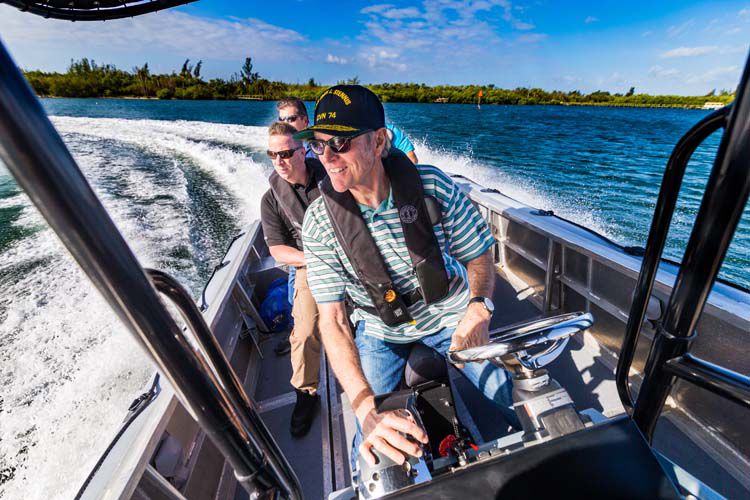Chief Rich Rosell is asking for a new police boat because the 18-foot Boston Whaler the Indian River Shores Public Safety Department relies on for water patrols and rescues is so worn out it has had to be towed back to shore more than once after engine failure.
Its aluminum fuel tank is corroded in spots, allowing fuel to leak into the bilge, which could affect electrical systems and cause a fire.
“That could be catastrophic,” said Shores Police Sgt. Shawn Hoyt.
Shores Public Safety regularly patrols the stretch of lagoon within the town – mostly idling in and out of the waterfront subdivisions several times a week looking for problems and making sure boaters and jet skiers follow the posted No Wake zone signs – and about once a month ventures out into the Atlantic on patrol or to answer distress calls.
Shores Public Safety has received a grant from the Florida Inland Navigation District that would cover 50 percent of the cost for a new boat – a maximum of $60,000 – and Rosell recently asked the Town council to provide a matching amount.
Whether the Shores Council will approve its half of funds is not yet known, but the matter was on the agenda for this week’s Thursday meeting.
Rosell told Vero Beach 32963 he’s reluctant to send his officers out on the nearly 20-year-old patrol boat knowing that it’s prone to stalling out. If he dispatches a pair of officers and the boat breaks down, his force is out two men until they get towed back in.
Both Chief Rosell and Sgt. Hoyt have used their own boats to tow the patrol boat back. They’ve also had to call on assistance from the Indian River County Sheriff’s Office – an embarrassing situation for the department.
The agency is thinking of buying a Boston Whaler 750 or a Mil-Pro Zodiac as a replacement for Marine 41, the worn-out craft that can no longer be relied on.
“We’re at decision time,” Sgt. Hoyt said.
The boats under consideration would be larger – 22.5 feet with a 15-person capacity – than the existing 18-foot vessel, which can carry only seven people. The new boat will be faster and more reliable, too, with twin 150-horsepower engines and a top speed of 48 mph, compared to one engine and a top speed of about 40 mph for the old boat.
It’s a reliability factor,” Chief Rosell said of the twin engine configuration. Even if one engine fails, “you can limp home.”
Greater passenger capacity will mean the department can better respond to boating emergencies. Two officers on the current patrol boat can only bring in four or five stranded boaters at one time. The new one would allow officers to take on as many as a dozen boaters in need. The new boat will carry 150 gallons of fuel and have a 300-mile range.
Sgt. Hoyt said that the patrol boat has been critical in getting police into areas they would not otherwise be able to reach and that it has been a part of as many as 10 life-or-death responses.
“In the summer, people make bad mistakes,” he said. “People overload their boats with passengers and get swamped or take their boats out in less than ideal weather conditions.”
The agency also handles marine and wildlife enforcement. Along with checking to make sure that fish and other sea creatures are legally taken, Shores officers notify the Florida Fish and Wildlife Conservation Commission of distressed animals such as pelicans, manatees and dolphin.
Sgt. Hoyt recalled a time several years back when pilot whales washed up on the shore, dead. Officers called in FWC, which performed necropsies. The patrol boat was then enlisted to tow the 1,000-pound carcasses out to sea for the ocean to sweep away.
The sergeant expects the department to sell the old patrol boat, the proceeds going to help pay for a replacement craft.
“Somebody’s going to buy that boat,” Chief Rosell said.
A Boston Whaler of the same age and similar condition could fetch between $12,000 and $20,000, according to Sgt. Hoyt.

